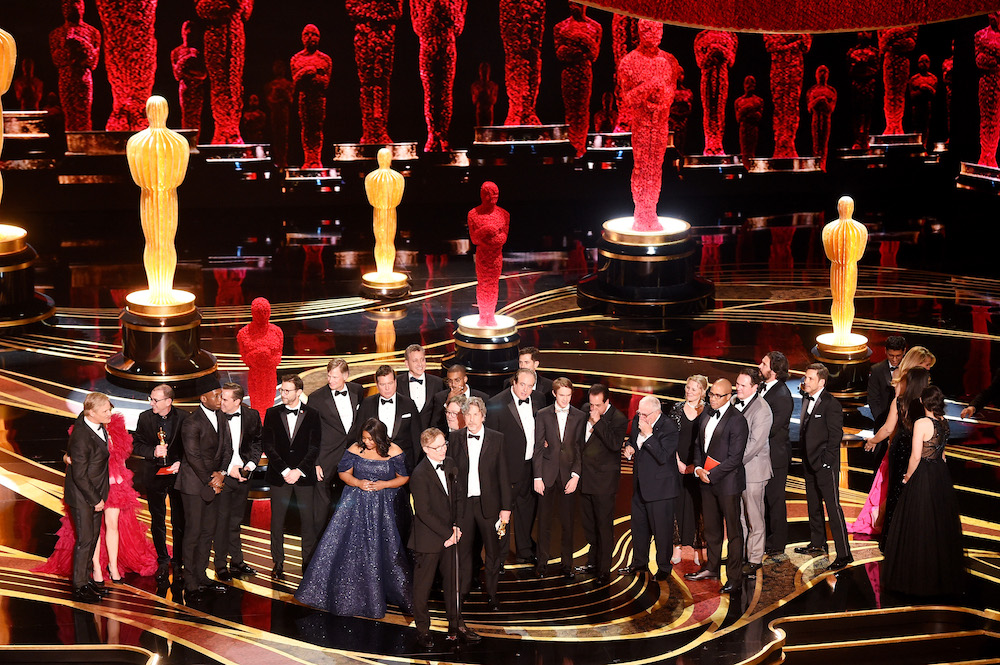Red-carpet ceremonies often serve as platforms for social commentary and rallying cries for the dominant cultural movements. Last year at the Golden Globes, for instance, a host of Hollywood women wore black to demonstrate solidarity with Time’s Up and the #MeToo movement.
And although coordinated outfits did not appear at the 91st Academy Awards last Sunday, the ceremony had plenty of moments that highlighted the ideals to which popular American culture currently aspires.
Not surprisingly, several of those ideals poorly reflected authentic human dignity, sexuality, and love.
But not all of them.
By the end of the night, the tried and true principles of love, marriage, and family had found a few precious moments to shine.
Of course, several of the nominated films themselves painted distorted ideals in vivid colors. “A Star is Born” and “The Favourite,” for instance, may very well have demonstrated spectacular acting, production design, and music. (There is no doubt that “Shallow” rightfully won best original song.)
But, sadly, they went right along with the Hollywood penchant for erasing the lines between love and lust.
Because these films have been glorified (and because the Academy did not shy away from flashing titillating scenes in the preview clips), they fan the flames of the already rampant sexualized mindset in our society. That mindset isolates sex from marriage, distances man from woman, and trades self-giving for narcissism.
Besides the nominations themselves, one of the biggest “message moments” of the night occurred when Emilia Clarke introduced the performance of “I Will Fight,” nominated for best original song and featured in the documentary “RBG.”
Even with Jennifer Hudson’s powerhouse vocals, the song was so unimpressive that it became readily apparent that its recognition had nothing to do with its musical quality but with its purpose.
“Sung as a rallying cry, an anthem, and a personal promise,” stated Clarke, “the song embodies the seemingly endless strength and commitment of its subject, Supreme Court Justice Ruth Bader Ginsburg — a woman who has spent her career at the forefront of the fight against gender discrimination.”
Of course, her fight has included securing the “right” for women to kill their own children in the womb and has helped end millions of innocent lives. But, all in the name of gender equality and ending discrimination, Ginsburg’s face was projected in the backdrop with a reverence akin to the kind shown for Martin Luther King Jr.
Tragically, the rejection of motherhood and new life is now honored as the pinnacle of female virtue and leadership.
To say the least, these attempted appeals to morality and authenticity, heartfelt though they might be, fell short. But despite the plethora of twisted ideals, a handful of moments throughout the night provided a glimmer of hope that even in the turbulence of Hollywood, truth cannot entirely suffocate.
For starters, one basic yet continuously profound acknowledgement recurred in acceptance speech after acceptance speech: families. Countless Oscar winners thanked their parents, said, “I love you” to their spouses, or called out to their children watching from home.
Simple, yes, but this small fact speaks volumes. In a world that seems to be charging toward the dissolution of the nuclear family as we know it, we should take heart in knowing that even the glamorous people in the spotlight, who often seem to reject traditional marriage and family most vehemently, often rely on it most ardently.
Perhaps the most moving shout-out of this kind came from Nina Hartstone, co-recipient of the Oscar for best sound editing, in “Bohemian Rhapsody.”
After profusely thanking her friends and family, she greeted her children watching from afar and said with a rapturous smile, “Mommy’s coming home soon!”
I don’t pretend to know what Hartstone thinks about “women’s rights” or “marriage equality,” but that brief moment still sent the heartening message that however much fame and honor the world might bring, being a mommy still matters.

John Warhurst and Nina Hartstone accept the Sound Editing award for “Bohemian Rhapsody.” KEVIN WINTER/GETTY IMAGES
Finally, the ceremony’s crown jewel award, Best Picture, went to a film that not only stands against racism but stands for enduring love in marriage and family. “Green Book” deserved the Oscar for its phenomenal acting and a stellar script — both of which also won the film an additional Oscar — as well as its ability to send a powerful message through a subtle storyline.
Aided by his friendship with Dr. Don Shirley, Tony “Lip” Vallelonga’s devotion to his wife flows into the letters he sends her while apart from her. That same devotion deepens the love of their marriage, strengthens the bonds within their family, and opens all their hearts to overcome prejudice and hate. That is a message worth upholding.
Although “Green Book” might be honored primarily as standard-bearer for racial justice (which it is), its victory also demonstrates that the pursuit of a strong marriage and family remains attractive.
The Oscars may be long, ostentatious, and politicized, but they are not yet a lost cause. In a ceremony that repeatedly lauded debauchery and the selfish disregard for human dignity, tucked away here and there were celebrations of true beauty and love.
As Barbra Streisand put it that night, “Truth is especially precious these days.” She was speaking about the film “BlacKkKlansman” (which won the Oscar for best adapted screenplay), but her words penetrate our society, both within the film industry and beyond.
Like a prized jewel, truth is valuable and scarce, and one must work hard to obtain and keep it. However difficult it might be to find, and however much it might seem to have disappeared beneath heaps of rocks and dirt, it exists, and it will never quite disappear.
Sophia Buono is a writer who lives in Arlington, Virginia.

